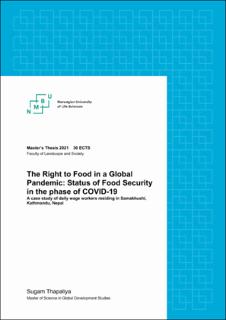| dc.contributor.advisor | Westengen, Ola Tveitereid | |
| dc.contributor.author | Thapaliya, Sugam | |
| dc.coverage.spatial | Nepal, Kathmandu, Samakhushi | en_US |
| dc.date.accessioned | 2021-12-29T13:15:04Z | |
| dc.date.available | 2021-12-29T13:15:04Z | |
| dc.date.issued | 2021 | |
| dc.identifier.uri | https://hdl.handle.net/11250/2835580 | |
| dc.description.abstract | The outbreak of COVID-19, followed by the lockdown imposed by the government to contain its spread, has brought Nepal to a standstill. As most of the economic activities have slowed down, food security amongst the vulnerable groups who fundamentally rely on daily wages to fulfill their day-to-day food needs is in a state of jeopardy. The rights-based approach to food security claims that the government and the society have a duty to identify who is vulnerable to food insecurity, and why they are vulnerable to make decisions regarding how to address food insecurities in the nation. The rights-based approach argues that despite there being enough resources available around the world to ensure food security, the inequalities and policies prevent the achievement of food security. Therefore, these advocates of a rights-based approach seek appropriate laws and policies to ensure the right of every human being. This research aims to study the consequences of COVID-19 on food security amongst the poor, and the government’s and NGOs’ food security measures, and the media and NGOs response to these through the lens of rights-based approach between 24th March 2020 (when the first lockdown was introduced by the government) and 20th May 2021. This research identified that the status of food security amongst the daily wage workers in Kathmandu in the phase of COVID-19 is deteriorating because the restrictions imposed to contain the virus resulted in weakening the already shaken foundation of food security amongst the vulnerable. The poor food accessibility amongst the daily wage workers was a result of loss of jobs affecting their purchasing power, the high price of food commodities, disruption of other sources of income, and fear of infection Further, inadequate food availability and poor food utilization too were the factors contributing to food insecurity amongst the respondents. Nepal being a signatory member of International human rights instruments binds the country to assure the rights to food to the citizens through law. However, the nation has failed to protect the right to food from its vulnerable citizens. The food security response ordinance produced by the government barely touches upon the food security principles, very few proceedings have been done by the government regarding food security in the phase of COVID-19. In contrast, a wide range of NGOs has come forward to provide food relief to the poor. This research paints a clear picture regarding the poor operationalization of the rights-based approach to food security in Nepal. It has been understood that the government of Nepal was not prepared, and its poor response has resulted in a food security crisis in Nepal. | en_US |
| dc.language.iso | eng | en_US |
| dc.publisher | Norwegian University of Life Sciences, Ås | en_US |
| dc.rights | Attribution-NonCommercial-NoDerivatives 4.0 Internasjonal | * |
| dc.rights.uri | http://creativecommons.org/licenses/by-nc-nd/4.0/deed.no | * |
| dc.subject | Food Security | en_US |
| dc.subject | COVID-19 | en_US |
| dc.subject | Nepal | en_US |
| dc.subject | Right to food | en_US |
| dc.subject | Daily wage workers | en_US |
| dc.title | The right to food in a global pandemic : status of food security in the phase of COVID-19 : a case study of daily wage workers residing in Samakhushi, Kathmandu, Nepal | en_US |
| dc.type | Master thesis | en_US |
| dc.subject.nsi | VDP::Social science: 200 | en_US |
| dc.description.localcode | M-DS | en_US |

